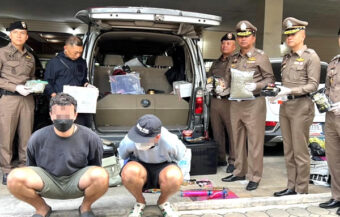There is a far bigger issue than just dealing with the current perfect storm of negative economic influences on small businesses and those struggling to survive at farming. It is this. Why is Thailand following a failed economic formula promoted by world bodies which has caused so much social disruption in western countries? GDP growth and success does not measure the full equation and not every country is the same.
Something significant is happening in the Thai economy and it is not good news. Whether Thailand continues to grow this year albeit at a slower pace, according to the IMF is one thing. Government policies, visions and investment programmes are another. But the people who know what is happening are the people who make their livelihoods doing so. They are Thailand’s bankers. What they are reporting is big trouble in Thailand’s traditional small and medium-sized business sectors and among the farming community. The problem is not only the negative external economic environment, it also the disruptive nature of new technology as well as the super baht. The result is an increase in non-performing loans in both sectors which face a deeply uncertain future. To some extent, the small and medium business sectors, just like the western tourists and the informal black economy, are being written off as the price Thailand must pay for the move to the new ‘high income’ economy that exists at the moment in theory while Thailand’s ecosystem of small businesses is being ravaged in reality.

Strong evidence is emerging from Thailand’s retail banking sector that Thailand’s traditional small and medium enterprise business base is experiencing what can only be described as a crisis. One banker, the President of Kasikorn Bank, this week was reported as saying that the former stability of such businesses is now open to question. This has consequently made the bank’s more prudent about advancing loan and as one banker put it, adopting a ‘hands-on’ approach to the management of loans that are already on the books.
The reasons for this are primarily two-fold. There is the disruption caused by technology and the movement of business and trade online but also the current economic environment. Banks are beginning to report higher levels of non-performing loans and a contraction of loans being advanced to these sectors.
Policies advanced by world trade bodies are bad for small business owners in Thailand
The policies being proposed by the Thai government in conformity with suggestions and proposals from the IMF and the World Bank will in due course only exacerbate what is happening to not only traditional small and medium-sized businesses in Thailand but also the huge Thai informal business or self-employed sector.
Ecosystem of small business at the heart not only of the economy but society
This will destroy the ecosystem of small businesses in Thailand which have traditionally been at the heart not only of the economy but of Thai society. The current economic drift has severe implications that have not been properly explored while the business leaders and politicians hail a bright but as yet untested and largely theoretical digital future.
‘High Income’ economy comes at a terrible cost. Is it one Thailand will be happy to pay?
Thailand, we are told, is moving to an ‘advanced’ or ‘high income’ economy. This may well run the risk or danger of creating the same social alienation that has ravaged European countries and the United States before the presidency of US President Donald Trump. It is a sobering thought. We are already witnessing a divergence between official growth figures quoted by the IMF and the Thai government with an altogether different reality appearing on the ground.
Informal or black economy being hit
Just last week, more data and evidence emerged that Thailand’s small and medium business sector is in real trouble. It came from the reports of the major banks confirming that loan books are contracting. This is a litmus test as to whether small business or local business is going forwards or backwards. Not only this, but the large black economy in Thailand has been the hardest hit as the retail sector suffers. One big reason for this is online competition but there is also evidence to suggest that consumers are worried about the overall economy.
Farmers and small traders in real trouble
The informal economy, like the farming sector who the bankers tell us is also in even deeper trouble this year, have in the past acted as a sort of safety valve for Thailand in times of economic difficulties before. A worker laid off could always hire a stall or return home to the fields. At one stage, it was estimated that 45 to 50% of Thailand’s real economy was covered by it. These are the traders and small shops that also help to keep the cost of living in Thailand lower.
All is not well with small business in Thailand
While the Thai banking sector reported steady progress and profits last week, there is a surfacing trend to suggest that things with Thailand’s small business sector all are not at all well. The information is coming from the bankers, the people who make a living from it and therefore can be more trusted than PR statements from government departments.
Non-performing loans for small and medium business at 7.9% according to Siam Commercial
At a press conference on Monday, a senior executive with SiamCommercial Bank revealed that in the first six months of 2019 the non-performing loan rate for small and medium business enterprises was 7.9%. She explained that the bank was working hard to keep the rate below 8% for the year.
Pikun Srimahunt is chief SME banking officer with the bank which last week reported a lower growth rate in profits. On Monday, the banker explained candidly and with insight, that Thai small and medium enterprises are suffering from intense competition at the hands of large corporations competing with them from both within Thailand and abroad.
Siam Commercial Bank cuts back on loans to small business so far this year as with other banks
Ms Pikun said that loans advanced to the sector by Siam Commercial Bank in the first quarter of the year contracted by 1.2% compared to the same period last year. This appears to be similar to the report filed by Bangkok Bank last week which while revealing that the bank’s profits had risen by 1.7% in the second quarter of the year, also revealed that its loan book has shrunk from the year before.
Thai consumer confidence index down four months in a row since February last
The emerging picture is pointing to a challenging situation in the Thai economy that exists right now and not the one hailed as the future. This coincides with Thailand’s consumer confidence index which shows consumer sentiment has now dropped four months in a row from 82 in February this year to a figure of June of 76.4.
New government’s policies may not be so good for small and medium-sized business
It is also becoming clear the small and medium enterprise may also be facing challenges from the existing policies being proposed by the incoming Thai government. The contentious proposal to raise the minimum income level to ฿400 per day has been criticised by the Chairman of the Federation of Thai Industries, Supant Mongkolsuthree, who warns that companies will struggle to adjust to the new requirement. The industry leader said that smaller businesses will suffer disproportionately from the move.
The new government is also planning to widen the tax base in Thailand and this must negatively impact smaller business operators. The Thai Deputy Prime Minister for Economics, Somkid Jatusripitak, recently advanced this as a key economic goal for the incoming government.
It must be said that a government stimulus package is being rolled out which will certainly help both sectors but of course, this is in itself an indication that they are in trouble.
Small business not adapting to technology
The Siam Bank SME executive, Pikun Srimahunt, has said that many existing Thai small and medium-sized businesses are finding it difficult to adapt their business activities to the use of new technology. They are also failing to diversify their client bases.
Head of TMB Analytics says non-performing loans in the agricultural sector is at 12%
Another banker this week gave an eerily similar prognosis for the Thai economy. He revealed an alarming figure of 12% for non-performing loans in the agricultural sector this year. Naris Sathapholdeja is the head of TMB Analytics. He estimated that the amount of non-performing agricultural loans outstanding to Thai banks to be worth ฿25 billion.
The retail and wholesale sector for small businesses is ‘worrisome’ right now in Thailand
He also described the retail and wholesale sector for small and medium-sized businesses is in a ‘worrisome’ situation. He cited one of the reasons for the crisis that has created a troubling environment for small business, as online competition which is causing Thailand’s traditional small businesses such as retail outlets and supply shops to disappear.
The TMB analyst said that retail entrepreneurs must now, because of this, begin to move their business activities online. The banking analyst highlighted higher non-performing loan rates across the retail and wholesale sectors including the wholesale of construction materials.
Kasikorn Bank president says the stability of the small business sector has decreased
Kasikorn Bank shared a similar outlook. It says that the stability of traditional Thai business in the retail and wholesale sector had decreased. Predee Doachai, the President of Kasikorn Bank, said the banks had therefore adopted a more cautious and prudent approach to advancing loans.
Further information and reading:
Government to introduce new economic stimulus package to boost Thai economy in emerging downturn


















